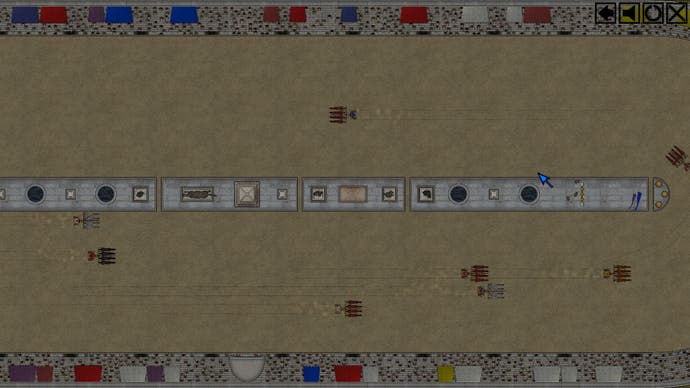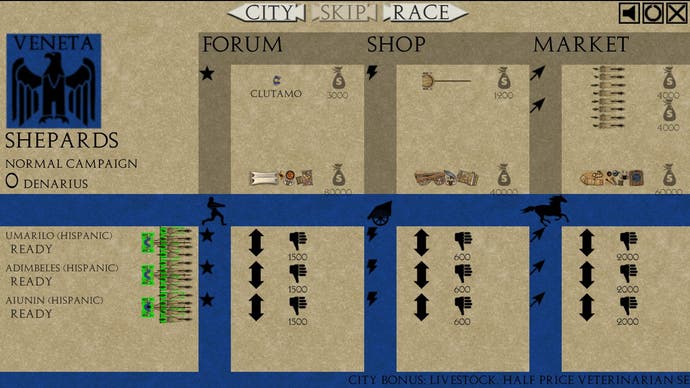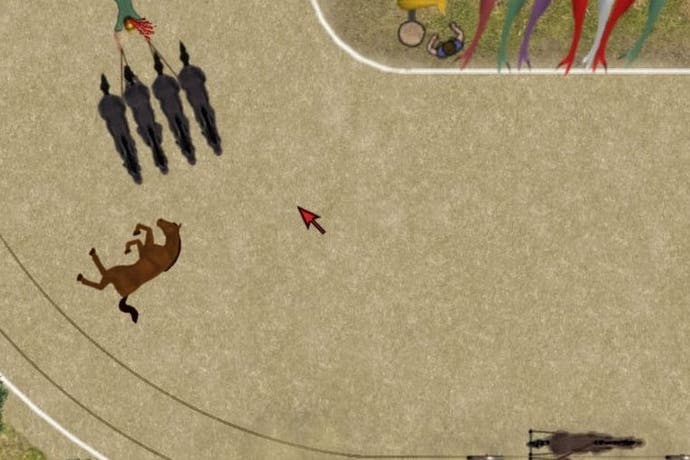Qvadriga review
Bellum, Pestilentia, Fames ac Mors.
Qvadriga is a tactical turn-based game about chariot racing, but as weird as that premise sounds, beneath the funky concept lies a functional and occasionally compelling game that only lacks depth and variety.
At the most basic level, you pick a chariot, a set of four horses and a driver before each race, which then plays out in 10-second chunks, punctuated by pauses where you pick what action your driver should try to perform during the next bit.
The first few turns are all acceleration to get up to standard racing speed, but even there you can pick the safe "accelerate" option or whip your horses to gamble their health in exchange for a chance at greater velocity. Because every map is also more or less an oval-shaped track, cornering is another one of those complex choice-junctions. You can go the safe route and stick to the edges at the cost of speed, or move to make a tighter turn and risk your chariot sliding out to a wider lane or turning over completely. Qvadriga is filled with these micro-trade-offs, and it distinguishes itself from other strategy or tactical games by relying more on risk management than an ideal plan that will always work.

This keeps play fresh and interesting, but it can also be rather frustrating because of the high general difficulty. As you continue playing, you pick up riders and equipment that will simply be better than others. After one close race, my rider died because the wheel on his chariot fell off and his horses dragged him behind. In frustration at losing my top guy, I shut off the game for a bit before letting the race fully resolve. When I opened the game again a few hours later, I noticed that it reset to just before the race and I was able to try again.
That discovery got me save-scumming more than I probably should have, but I also found that in any given race your starting position and other variables are completely random. Since most of the racers will be close to one another during the first lap, starting position can often determine how risky your first turn is, and there's no mechanic that helps you select which lane you start in for some other trade-off. After playing the same race a few times trying to get better results, it's frustrating to see just how much of your performance is determined entirely by chance. That said, it's doubtful that if I hadn't quit early I would have noticed, and it's telling that a turn-based tactical game about chariot racing got me so invested.
The campaign pulls straight from any modern sport simulator. You pick a city, each with different bonuses, begin to build your team and then start competing for fame and fortune. There are six available factions, all from various bits of the Mediterranean, and all roughly matching their real-world inspirations. Bonuses can range from heartier or faster horses, more skilled chariot racers, etc. Each of these plays into a complex tactical system that asks you to play your strengths against your opponents' weaknesses, and it works remarkably well.
I chose the Venetians for my campaign, and my team had bonuses to rider skill, chariot construction and slightly faster horses. That led me to develop an aggressive strategy wherein I accelerated early, moved into the tighter corners to reduce the total distance my horses had to run and counted on my driver's skill to keep everything in line. If I'd had stockier horses or drivers, I could have just as easily tried to physically assault other drivers with my whip or repeatedly ram their chariot to dislodge a wheel.

Qvadriga's structure allows for a variety of tactics, but only up to a point. As you play, more chariots, riders and horses become available for purchase - each with different stats. These upgrades are expensive, but after a couple of dozen races I had a nearly maxed-out team. At those higher levels of play, with all of the upgrades, it's difficult if not impossible to take advantage of weakness in other drivers. With everyone being nearly equal, the random elements of play become more influential to Qvadriga's detriment. Without a more complex or nuanced system of upgrades and the kinds of tactical trade-offs that make the rest of the game so interesting, Qvadriga's appeal fades a lot faster than it should.
That's a shame because of how initially enthralling races are. During tense moments, selecting an action like a rapid lane change to close a gap between you and the race leader can be agonising in the best way. In one case, I decided to risk a tighter turn at the Circus Maximus before another racer crushed my chariot. My driver, having an absurd amount of health, was able to hold onto the reins just long enough to cross the finish line and finish the game. The moments before that were filled with me swearing at the top of my lungs to the annoyance of my roommates.
However, when the excitement of that final race faded, I couldn't think of a reason to play again, or try the "Epic" campaign. That's the best way to describe Qvadriga, I think. Exhiliration followed by a cool malaise.

